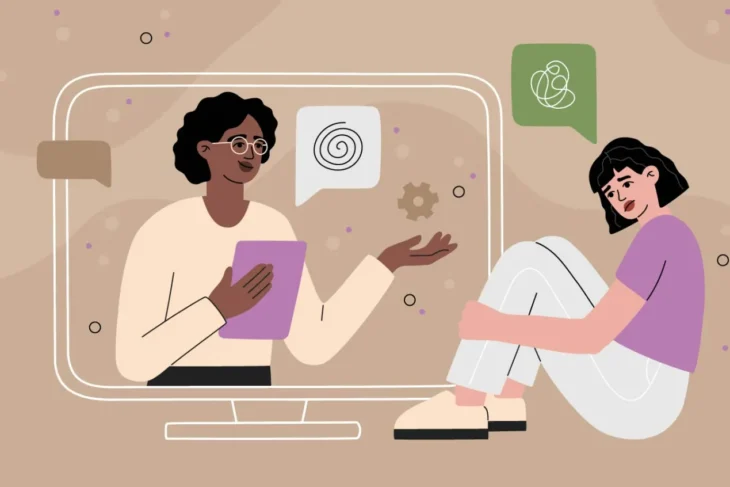No one is going to argue that the COVID-19 pandemic was good for our mental health. The data shows otherwise, with the American Psychological Association reporting that 48% of adults have suffered increased stress in their lives due to the pandemic.
There is a silver lining, however. The pandemic forced many businesses to adopt new business models, and this resulted in many mental health providers (counselors, therapists, psychiatrists etc.) expanding their telehealth infrastructure to reach more people. Now that we are (hopefully) coming out of the pandemic, the result is that many people are continuing to use telehealth for their mental health care appointments. In 2024, up to 50% of all psychology and 30% of all substance use disorder treatment was provided remotely.

Source: blog.cureatr.com
Contents
- What Exactly is Telehealth Treatment?
- Is Telehealth Effective For the Treatment of Mental Health?
- Some More Benefits of Telehealth
- Telehealth Removes Barriers to Starting Counseling
- Telehealth Allows for Anonymity and Helps Overcome Stigma Barrier
- Telehealth Removes the Transportation Barrier
- Telehealth Allows Disabled People Greater Access to Counseling
- Telehealth Allows for Greater Flexibility in Scheduling Mental Health Appointments
- Retention Rates are Higher for Telehealth Allows Disabled People Greater Access to Counseling
- Telehealth Improves the Experience for Providers, Too
- Telehealth is Preferred by Many, Especially Younger Patients
- Getting Mental Health Help via Telehealth
What Exactly is Telehealth Treatment?
Telehealth uses web-based tools to provide care “remotely,” usually from a cell phone or a computer. Telehealth is strongly associated with video conferencing (in addition to audio feed), but a phone call can also be considered telehealth. Other terms for telehealth include tele-med, remote treatment, telepsychiatry, online therapy, or virtual treatment.
Is Telehealth Effective For the Treatment of Mental Health?
The majority of mental health counseling is a verbal exchange between the counselor and the patient (or group of patients). While there are some benefits to being in the same room as the provider, telehealth has been shown by many studies to be just as effective as ‘in-person’ care. The results have surprised even telehealth’s most staunch supporters.
“What the American Psychological Association’s studies have shown, is that telehealth is essentially just as effective as face-to-face psychotherapy—and retention rates are higher,” says Scott H. Silverman, who uses telehealth to treat addiction and trauma in San Diego, California at Confidential Recovery.

Source: pewtrusts.org
Some More Benefits of Telehealth
The efficacy of telehealth is obviously the primary concern, but there are several other reasons why it is beneficial to patients. Here are a few of those.
Telehealth Removes Barriers to Starting Counseling
Scott H. Silverman says that telehealth has been instrumental in getting connected to some ‘at-risk’ individuals who need his help. “No matter what you are doing, you can always get online, whether it be from a phone or your laptop. With telehealth, you don’t even have to get out of your chair to reach someone who can help you, and that powerful for people who are in the addiction’s destructive grasp. Many of the most successful patients I’ve helped started their journey to recovery through telehealth”

Source: bcbs.com
Telehealth Allows for Anonymity and Helps Overcome Stigma Barrier
Stigma is a great hindrance to those struggling with a mental health disorder getting help. Because of widespread negative stereotypes and fear, many people with mental health disorders experience shame and other negative feelings which can exacerbate their diagnosis. Moreover, they can be in denial of their condition or just refuse to seek help out of the fear of being judged. The privacy and confidentiality that online counseling affords can remove some of these barriers to the person seeking help.
Telehealth Removes the Transportation Barrier
Over half of U.S. counties have no psychiatrists, and even in areas that have mental health providers, there are often not enough to meet the need — especially if patients must travel long distances to reach available providers. Mental health services can be difficult to locate, and it’s important to have a counselor with whom you feel a sense of ‘rapport.’ During COVID-19, we were all encouraged to ‘shelter in place, ’ and the availability of public transportation was reduced in certain areas. Many people lost their cars as a result of financial hardship. But, almost everyone has a cell phone, which gives them access to telehealth counseling.

Source: docready.com
Telehealth Allows Disabled People Greater Access to Counseling
People with cognitive, movement, or other kinds of disabilities (including blindness) can have a hard time traveling to mental health care appointments. With telehealth, they can connect with their care provider for regular meetings without having to worry about traveling across town.
Telehealth Allows for Greater Flexibility in Scheduling Mental Health Appointments
Therapists are known to keep short hours. They share office space with others, work at a hospital or treatment center part of the time, etc. Many patients have been frustrated with the difficulty of nailing down an appointment. With the advent of telehealth, providers are often able to accommodate a wider range of hours, including nights and weekends, if they so desire. There is no longer the constraint of having to procure available office space to facilitate the sessions.

Source: khn.org
Retention Rates are Higher for Telehealth Allows Disabled People Greater Access to Counseling
it is always a challenge for mental health care providers to retain their clients long enough to help them achieve their goals. Frequently, mental health patients drop out of treatment prematurely. Studies have shown that telehealth patients have higher retention rates than their ‘in-person’ counterparts.
Telehealth Improves the Experience for Providers, Too
Mental health professionals have long been known to suffer from inordinate burnout, and rightly so. Many of the conveniences and benefits of telehealth also apply to counselors, therapists, and psychiatrists.

Source: yalemedicine.org
Telehealth is Preferred by Many, Especially Younger Patients
Mobile phones are simply the dominant way to communicate in 2024. This is how many young people wish to talk, and it’s what they’re comfortable with. Arguably, it’s what they’re better at too, which is important when accurately expressing oneself.
Getting Mental Health Help via Telehealth
If you or someone you love is in need of mental health treatment, do not delay! It can be as easy as using one of the free resources and having a cell phone or computer. MentalHealth.gov is one resource, and for substance abuse issues, you can reach the Substance Abuse and Mental Health Services Administration (SAMHSA) at 800-662-HELP (4357). This government resource catalogs providers in every city and state, and their toll-free number is staffed 24/7. Also, the suicide prevention hotline may be of help at 1-800-273-TALK (8255).
